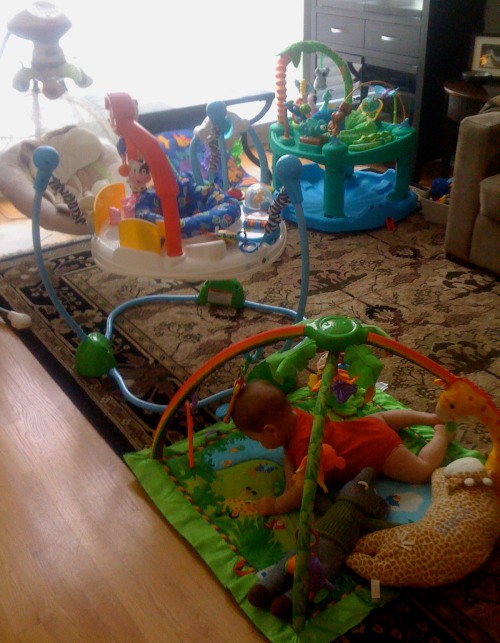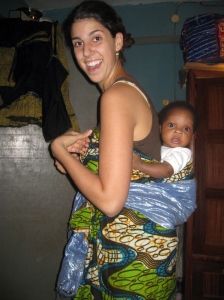A big event happened when I was in Nigeria– I became an aunt.
When I finally met the lil’ guy last week I was initially overcome with mixed feelings of love and disgust; that, after much thought, have transitioned into pure love. It was pretty much love at first sight when I saw my nephew. He is so well tempered and too cute for his own good, but he came with so much equipment! A play pen, fancy carrying devices, bags full of baby supplies, the list goes on. All of that stuff upset me and made me think about the difference between a baby’s life in Nigeria and America.
—
Walking into the parents’ house was like entering a friendly plastic jungle. Arranged on the floor of their Chicago condo was an array of bouncing contraptions, swinging devices, soft rugs below small canopies adorned with miniature, brightly colored toucans, snakes and butterflies. Everything is suckable, child-proof and might break into song if you touch it the right way.
When I first got back, noticing the amount of unnecessary baby accessories in the United States made me uncomfortable.
I compared the fancy strollers in America to the colorful cloths most African women use to carry their little ones on their backs and thought, why do we need all this stuff?
Babies in Nigeria and America play with many of the same little plastic toys, blocks, dolls, Barbies (a lot of Nigerian parents bring toys back from the UK). It’s not like Nigerian babies are living a deprived life with nothing but clay and sticks to play with. Babies, a documentary that follows the everyday life of four infants in four different countries,is a testament to the fact that babies will find anything to entertain themselves whether its a $100 contraption with sounds and twirly things or a spool of thread. In Nigeria,
I noticed babies have toy cars, rubber animals to suck on while they teethe, diapers and bottles, they just use fewer of them. So when I re-entered the U.S., it was a shock to me to see how many seemingly unnecessary items American parents surround their children with.I pondered in the materialistic-ness of America’s babies for a while, then my good friend helped me realize something. The fact that some families spend lots of money on mother care and smother thier children with toys and things that will hopefully keep them from crying and stimulate their brain, doesn’t mean they are better or happier than the mother who ties the baby to her back and feeds the baby breast milk instead of organic creamed carrots. More stuff doesn’t make someone happier than another person, or one baby better than another. Both babies will probably not remember the toys they played with when they were 7 months old anyway…








